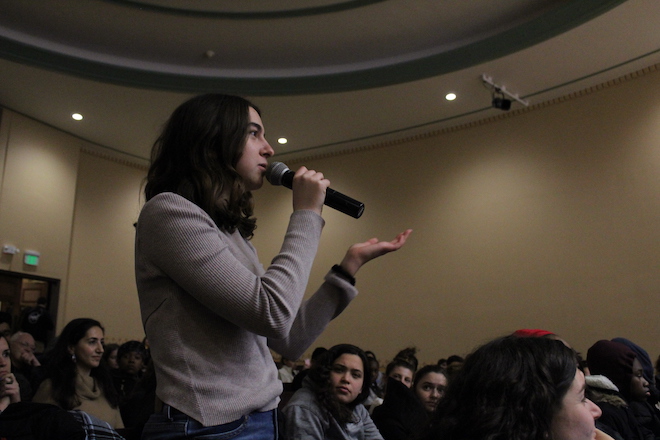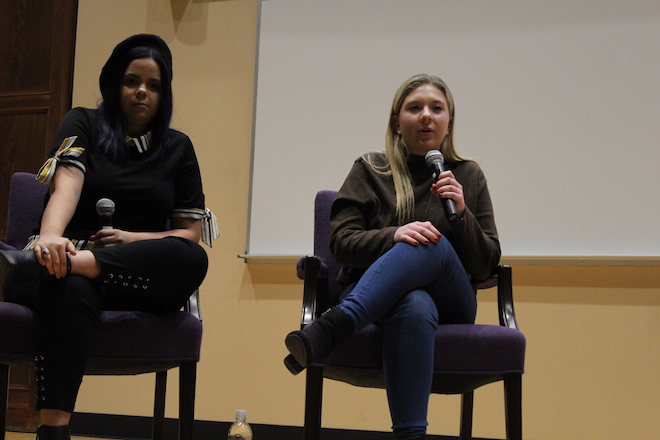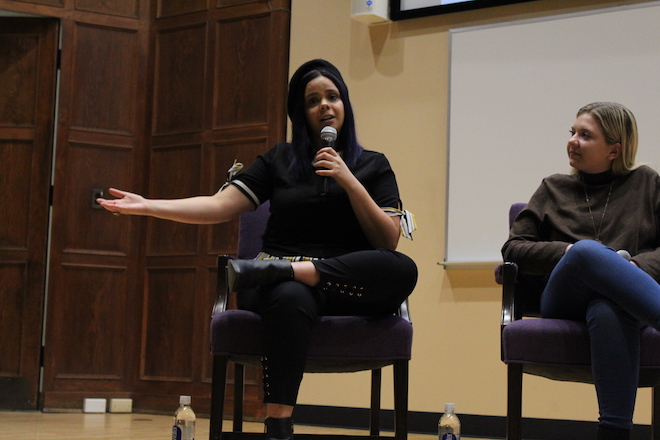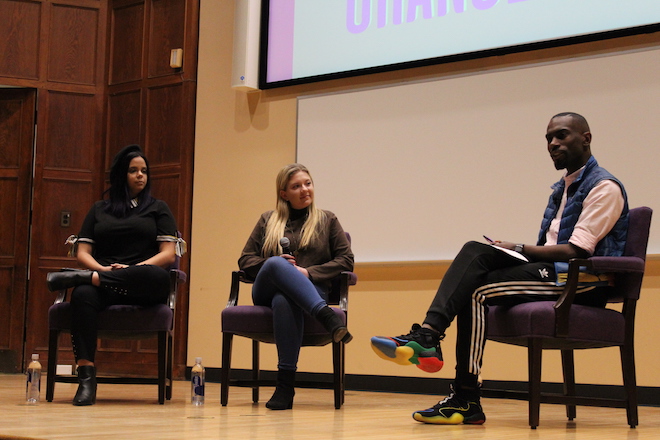Almost 10 months after the shooting at Marjory Stoneman Douglas High School, survivor Samantha Fuentes is still learning to grapple with what it means to be a gun violence survivor. Large crowds are still terrifying, making Fuentes worry that a gunman could burst in, and at times a small thing going wrong make Fuentes worry about death.
Members of the Northwestern community and beyond gathered Saturday evening in Lutkin Hall to attend “Guns, Activism, Change,” a conversation hosted by NU College Democrats that featured Samantha Fuentes and Jaclyn Corin. DeRay Mckesson, a civil rights activist who focuses on innovation equity and justice, a major voice in the Black Lives Matter Movement and the host of Pod Save the People, moderated the discussion.
“In the very beginning, I didn’t want to be an activist. In the very beginning I gotten shot in my legs, my whole face was bloodied up, I had shrapnel in my mouth and in my cheek, I was almost blinded, I couldn’t walk around on my own, I had to walk on a cane. I felt like the very opposite of what a strong person would feel like,” Fuentes said. “I became an activist because I never want anyone to experience that pain, that grief or that sorrow that I hold in my heart every single day.”
Fuentes said she felt called to speak out because of how the shooting affected her and her fellow students.
“I do what I do because I’ve lost people I’ve loved. I do what I do because I lost pieces of myself that I was confident about," Fuentes said. "I am now carrying these new insecurities, this PTSD, this new set of eyes, and that’s a sensation that I don’t think anyone in this room should have to worry about. I do it for Nick, I do it for Helena, I do if for everyone I lost that day and everyday after it,” Fuentes said, naming the students who died in her class.
Remember: You are not witnessing these tragedies from behind the safety of your television or iPhone.
— Sam Fuentes (@funkpuncher) May 20, 2018
It’s happening all around you.
Pull back the curtains, see the world for what it is now, so that later you won’t have to hide from that very window to save your own life.
Jaclyn Corin, a current student at Marjory Stoneman Douglas High School and a co-founder of March For Our Lives, described grappling with the knowledge that her high school had become a part of a growing list of mass shootings in U.S. schools.
“I went home, and I saw the TV screen, and it said Virginia Tech, Sandy Hook, all of the notable mass shootings that we all grew up with, and then it said Marjory Stoneman Douglas High School under that," Corin said. "It’s a difficult thing to understand when you grow up with these words and tragedies and videos of people running out of Columbine High School. Then, suddenly your high school is a part of that list that nobody wants to be a part of."
No one is safe in present-day America.
— Jaclyn Corin (@JaclynCorin) November 9, 2018
For Corin, senior year comes with unique struggles.
“It’s definitely very very difficult to be in high school still, especially at the high school I’m at. I have to park in the senior lot every day and pass the building that was shot up, and see the big lock on the door, and that’s the beginning of my day every single day,” Corin said.
Fuentes, who finished classes online and graduated, remembers a conversation with Ivy Schamis, the teacher of the History of the Holocaust class, on the day of the shooting.
“This is the last time you’re going to see me, because I’m leaving, I’m not coming back,” Fuentes said. “Ironically, sadly, it ended up being that I didn’t come back. I didn’t feel safe, I didn’t feel like it was ever going to feel normal for me.”
Despite their difficulties and trauma, Corin and Fuentes are striving to heal.
“Self-care for me is just taking time off of work and not having a phone call for the afternoon or going shopping for myself,” Corin said. “It’s just taking time with the friends and family members that are still there for you and care about you. It’s something that I have to grapple with every single day.”
For Fuentes, self-care means taking care of mental health and a healthy amount of crying, instead harboring emotion inside.
“Self-care can mean a lot of things, with someone who suffers with mental illness, it means going to therapy, seeing my therapist regularly,” Fuentes said. “One of the most underrated activities is crying. Crying really helps. I love crying; I cry all the time. Any time I need to cry, I’ll go on Netflix and I’ll put on Coco.”
NU College Democrats co-president Claire Bugos* spoke to the importance of hosting Fuentes and Corin, especially in light of Northwestern’s own hoax shooting last year.
“I was very inspired by the way that all of the activists on stage held themselves and communicated these really complex feelings that they have, and the way that they’re able to be so human and relatable, but also so strong and articulate,” Bugos said. “I’m not a victim of gun violence, but I felt that I could understand their pains and experiences in ways that I hadn’t before.”
Despite trauma Fuentes has undergone and continues to work through, there are glimmers of hope. “Making a difference” and “inspiring people” are like “glimmers of hope and light” for Fuentes. Fuentes met a survivor of the Sandy Hook shooting at a dinner with survivors and those affected by the shooting.
“She, for the first time ever, told her story, and it was to me. I learned that her and her fellow peers had to climb over a mountain of bodies to run out of the hallway to run into a neighboring house, to run out of Sandy Hook Elementary School while the shooter was reloading. After she met me, she texted me, ‘You’re my new role model,’” Fuentes said. “Knowing that I can impact someone like that, and to be able to have them tell their own story...is more than enough for me, more than enough hope.”
*Editor's note: Claire Bugos is an editor for North by Northwestern.



